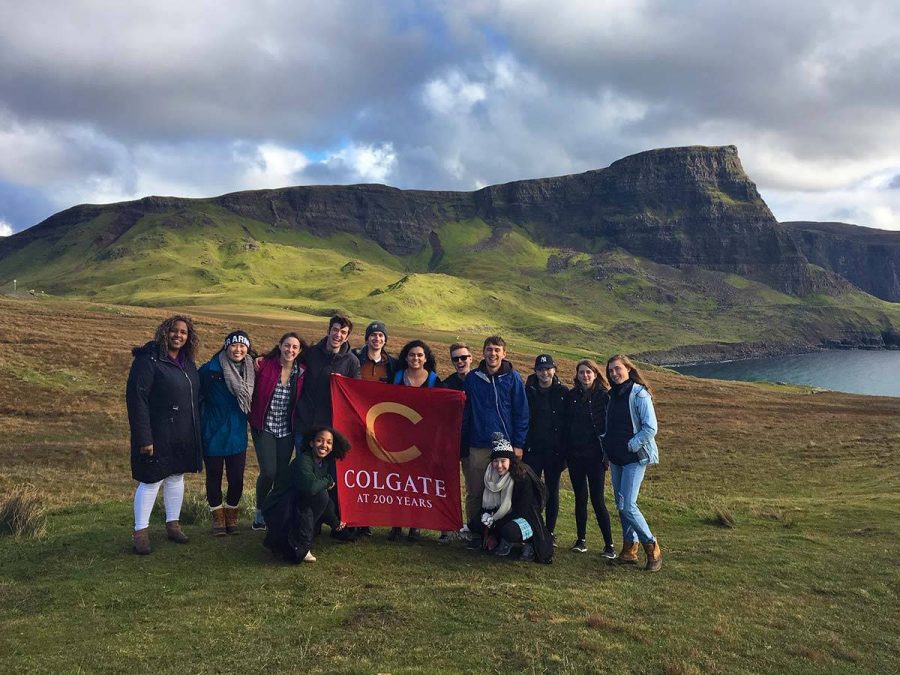Off-Campus Study Adjusts to Constant Changes as Spring Programs Approach
As the end of the semester approaches, students currently studying abroad are winding down their experiences while students who will study abroad in the spring begin preparations. Applications for future programs begin to roll in as Spring 2022 Pre-Departure meetings begin in the Office of Off-Campus Study (OCS) whose work looks different this semester after more than a year of various COVID-19 restrictions and international travel regulations.
In an average semester, approximately 250 Colgate University students study in various off-campus programs both internationally and domestically in cities like Washington, D.C. and New York. Associate Director of Off-Campus Study Cas Sowa reported that the number of students studying off-campus this semester caps off around 100 with about a 30-70 split between approved programs and Colgate Study Groups, respectively.
One reason this number is lower than average is that some study programs were canceled and no longer offered for this upcoming semester.
According to Sowa and Director of Off-Campus Study Joanna Holvey Bowles, Fall 2021 study groups in Trinidad, South Africa, Singapore, the National Institutes of Health in Washington and Venice, Italy were all canceled. The Wollongong, Australia Study Group was not canceled, but rather moved to Copenhagen, Denmark. Approved programs in New Zealand, Australia, Japan, China, South Korea, India and most Latin American and African destinations similarly did not run.
The decision to cancel programs is made by a committee from OCS in conjunction with the University’s emergency management teams and partners overseas, and it is influenced by a number of considerations.
“[In] Australia, we didn’t have a choice. The government just said ‘We’re not processing student visas.’ Same thing for New Zealand, same thing for China, same thing for Japan,” Sowa said. “In the case of South Africa, we just couldn’t run it when the university is still remote. A student doesn’t want to go and spend a semester sitting in a dorm.”
Sowa said that OCS also looked to its international partners and local organizations to learn from their operations, as well as recommendations from the CDC and the New York State Department.
“We just didn’t rely on any one thing — it’s a combination of different things,” Sowa said. “Looking at the Department of Health of countries overseas: were their hospital systems being overrun? We didn’t want to contribute to that by bringing more people into a locale if they’re currently suffering.”
Junior Lucy Nentwick’s study abroad plans were thrown into uncertainty when the Wollongong, Australia Study Group she was part of for the Fall 2021 semester was canceled.
“[The Study Group] was canceled around March because Australia hadn’t re-opened their borders,” Nentwick said. “It was a huge bummer because Australia was my number-one choice for study abroad, but luckily my program’s professor and advisor tried really hard to have a backup plan for us and they came up with [the Danish Institute for Study Abroad, or] DIS — Study Abroad in Copenhagen, Denmark.”
Now studying among hundreds of American students in Copenhagen, Nentwick is taking five classes, including Danish language and culture and the group’s core class, taught by Associate Professor of Peace and Conflict Studies and Geography Teo Ballvé.
“It’s been an incredible experience being in Copenhagen. There’s always so much to do and it turns out there’s so much history in the city it’s hard to get bored of being here,” Nentwick said. “The food is great, traveling is fun, nightlife is fun — overall it’s been so amazing. Luckily for us, Denmark has a very high vaccination rate so there are virtually no COVID-19 restrictions. It’s basically what a normal school year was like. No one wears masks anywhere, you don’t need to show vaccine cards anymore, etc. It was a little strange to get used to at first, but now it’s going to be hard going back to all the restrictions when we come home.”
Other Colgate Study Groups currently taking place include those in Madrid, Spain, Geneva, Switzerland, London and Manchester.
Unlike a normal year, when students on such programs frequently travel across their geographic region, independent student travel was initially restricted to within their country of residence.
“The other thing that Colgate did, along with a lot of our approved programs and some of our other partners: students are not really allowed to travel independently outside of their study groups,” Sowa said, noting the rule was under review at the time of the interview. “So, if you’re a student in England, you have to remain in England. The reason for that is we were still uncertain about borders when students first went abroad, there were still all of the quarantine issues.”
On Nov. 2, OCS updated this policy to make programs more accessible to students.
“While continuing [to] strongly encourage students not to travel outside the host country, students can now do so by meeting several provisions,” Sowa and Bowles said. “These include discussing their plans with their faculty director, and limiting the travel to Schengen countries (most of the EU) or to the United Kingdom (England, Scotland, Wales and Northern Ireland) by registering their travel, once approved, through the Colgate student travel portal and to gain approval by not missing academic or study group activities in order to travel.”
OCS and the University Emergency Operations Center looked at various metrics in making this decision, noting that COVID-19 cases and hospitalizations — at the time of review — were declining and other western European countries had relaxed their border policies.
“Travel policies continue to change and evolve, so it is important for students to remain aware of policies both within their country of study and how they relate to any other locations visited,” Sowa and Bowles said. “What Colgate wants to avoid is having students stuck in other countries, alone, without resources because of a positive COVID-19 test result which prevents them from returning on time to their study groups.”
Looking forward to the upcoming semesters, Spring 2022 programs also suffered cancellations. Study Groups in Wollongong, Australia, Otago, New Zealand, Japan, and Washington, DC are not running next semester, nor are approved programs in New Zealand, Australia, India and China.
Despite this, Sowa said that there is a larger-than-normal group of students going abroad next semester.
“But, I think that’s understandable because nobody knew what the Fall was going to look like at the time, and now that it’s working, I think some students who had originally considered Fall they came in and said, ‘Can we do Spring semester?’” Sowa said.
He also described a high level of interest for Fall 2022 and Spring 2023 programs.
“We know that the number of students attending information sessions seems to be higher this Fall,” Sowa said. “The number of students setting up appointments with the staff in the office has been higher. So interest seems to be there.”
Sophomore Gretchen Mueller applied to the Madrid Study Group and the Manchester Study Group and intends to study off-campus during the Fall 2022 semester.
“Both of the programs that I am interested in have to do with my majors, so I think either one would be a good opportunity to delve deeper into my areas of interest,” Mueller said. “I think that being abroad would give me a level of independence that Colgate isn’t designed for. I definitely also want to spend time outside of Colgate’s little bubble.”
Aside from the Venice Fall 2022 Study Group application which has been extended, applications for Fall 2022 and Spring 2023 Study Groups were due on Wednesday, Nov. 3.

Josie Rozzelle is a senior from San Francisco, CA concentrating in political science with a minor in French. She has previously served as multimedia manager,...











